Irreconcilable Differences?
Irreconcilable Differences?
Explaining Czechoslovakias Dissolution
Edited and translated by
Michael Kraus & Allison Stanger
Foreword by
Vclav Havel

ROWMAN & LITTLEFIELD PUBLISHERS, INC.
Published in the United States of America
by Rowman & Littlefield Publishers, Inc.
4720 Boston Way, Lanham, Maryland 20706
http://www.rowmanlittlefield.com
12 Hids Copse Road
Cumnor Hill, Oxford OX2 9JJ, England
Copyright 2000 by Rowman & Littlefield Publishers, Inc.
All rights reserved. No part of this publication may be reproduced, stored in a retrieval system, or transmitted in any form or by any means, electronic, mechanical, photocopying, recording, or otherwise, without the prior permission of the publisher.
British Library Cataloguing in Publication Information Available
Library of Congress Cataloging-in-Publication Data
Irreconcilable differences? : explaining Czechoslovakias dissolution
/ edited by Michael Kraus & Allison Stanger.
p. cm.
Includes bibliographical references and index.
ISBN: 978-0-8476-9020-6
1. CzechoslovakiaPolitics and government19451992.
2. CzechoslovakiaEthnic relations. I. Kraus, Michael, 1949
II. Stanger, Allison.
DB2228.7.I77 1999
943.7043dc21
99-41680
CIP
Printed in the United States of America
 The paper used in this publication meets the minimum requirements of American National Standard for Information SciencesPermanence of Paper for Printed Library Materials, ANSI Z39.481992.
The paper used in this publication meets the minimum requirements of American National Standard for Information SciencesPermanence of Paper for Printed Library Materials, ANSI Z39.481992.
Contents
Vclav Havel
Michael Kraus and Allison Stanger
Michael Kraus and Allison Stanger
Carol Skalnik Leff
Jan Rychlk
Petr Kopeck
Sharon Wolchik
Frantiek Turnovec
Allison Stanger
Owen V. Johnson
Jan Svejnar
Michael Kraus
Jn arnogursk
Petr Pithart
Daniel Kroupa
Miroslav Macek
Milan Zemko
Peter Zajac
Martin Vadas
Stanley Hoffmann
Michael Kraus and Allison Stanger
Pedmluva
Jako oban jsme se vdycky ztotoovali se sttnost eskoslovenskou. eskoslovensko jsme poci ovali jako svj pirozen domov a sama mylenka na jeho rozdlen byla tvrdm tokem na tuto nai identifikaci. Proto mnoz z ns vloili nemlo sil do pokusu pebudovat tehdej formln federaci na federaci skutenou a demokratickou, v n by se vichni ctili dobe. Toto sil nevedlo k spchu. Historikov s odstupem asu posoud, zda bylo nespn proto, e bylo nekoncepn, nedsledn nebo v samch svch vchodiscch tak i onak vadn, anebo proto, e tv v tv slovenskm tubm spn prost bt nemohlo. A
ovali jako svj pirozen domov a sama mylenka na jeho rozdlen byla tvrdm tokem na tuto nai identifikaci. Proto mnoz z ns vloili nemlo sil do pokusu pebudovat tehdej formln federaci na federaci skutenou a demokratickou, v n by se vichni ctili dobe. Toto sil nevedlo k spchu. Historikov s odstupem asu posoud, zda bylo nespn proto, e bylo nekoncepn, nedsledn nebo v samch svch vchodiscch tak i onak vadn, anebo proto, e tv v tv slovenskm tubm spn prost bt nemohlo. A tak i onak, po parlamentnch volbch v roce 1992 bylo u zejm, e se n dosavadn stt rozdl. esk politick reprezentaci pat uznn za to, e tak nronou operaci, jakou je rozdlen sttu, se j podailov trval a trpliv souinnosti se slovenskou stranouprovst pokojnm, prvnm a spodanm zpsobem. Zakld to dvryhodnost obou nstupnickch stt i perspektivu jejich dobrch vzjemnch vztah.
tak i onak, po parlamentnch volbch v roce 1992 bylo u zejm, e se n dosavadn stt rozdl. esk politick reprezentaci pat uznn za to, e tak nronou operaci, jakou je rozdlen sttu, se j podailov trval a trpliv souinnosti se slovenskou stranouprovst pokojnm, prvnm a spodanm zpsobem. Zakld to dvryhodnost obou nstupnickch stt i perspektivu jejich dobrch vzjemnch vztah.
Rozdlen eskoslovenska bylo nepochybn pro mnoh z ns bolestiv. Pesto nebylo provzeno z esk strany pocitem kivdy, bolestnstvm, vitkami i dokonce odporem ke Slovensku a ke Slovkm. Pochopili jsme, e Slovci maj prvo na samostatnost. I tato okolnost je nesmrn dleit: kdyby n rozchod byl provzen trpkost, zatilo by to nadlouho nae vztahy, co by se poslze obrtilo proti vem.

Foreword
Vclav Havel
As citizens, we have always identified with Czechoslovak statehood. We have felt that Czechoslovakia was our natural home, and the very idea of its division was a harsh assault on our sense of identity. That is why many among us expended considerable effort in the attempt to rebuild the existing formal federation into a genuine and democratic federation in which all would feel at home. This effort was unsuccessful. With the passage of time, historians will judge whether it was unsuccessful because it lacked a clear vision, because it was inconsistent or somehow flawed in its very points of departure, or because face to face with Slovak aspirations, it quite simply could not have been successful.
Whatever the answer, after the parliamentary elections of 1992, it was quite apparent that our existing state would have to be divided. Czech political representatives deserve recognition for carrying out this demanding operationin persistent and patient cooperation with the Slovak sidein a peaceful, legal, and orderly manner. It lays the foundation for the credibility of both successor states and the prospect of good mutual relations.
Undoubtedly, the division of Czechoslovakia was painful for many of us. Despite that, it was not accompanied on the Czech side by a feeling of injury, by self-pity, by reproachfulness, or even by disgust for Slovakia and the Slovaks. We came to realize that the Slovaks had the right to independence. This fact, too, is immensely important: had our parting of ways been accompanied by bitterness, it would have burdened our relations for a long time. Eventually, this burden of bitterness would have turned against us.
Translated from Czech by Michael Kraus and Allison Stanger
Acknowledgments
This modest volume would never have seen the light of day without assistance and inspiration from a wide range of sources. An International Research & Exchanges Board (IREX) Special Projects grant provided the primary funding for the June 1996 Prague conference that led to this book. Our research in the Czech Republic and Slovakia during 19951996 was also generously funded by twin IREX individual advanced research grants and a joint grant from the National Council for Soviet and East European Research (contract 810-30). Along the way, Middlebury College has been exceptionally supportive of our quest to transform a set of conference papers in three languages into a coherent book. For this invaluable financial assistance and the vote of confidence it represented, we are very grateful.
We remain indebted to Jan Svejnar, Director of the Economics Institute (EI), and Frantiek Turnovec, Director of the Center for Economic Research and Graduate Education (CERGE), and the always accommodating staff of CERGEEI for providing us with a stimulating intellectual environment, both during our sabbatical year in Prague and in subsequent summers, as well as the most gracious of conference facilities. The Institute of Political Studies at Charles University as well as its director, Rudolf Kuera, deserve acknowledgment for their support of our conference endeavors.
In addition to the individuals whose formidable contributions comprise this volume, we would like to thank the other conference participants, whose participation enriched the quality of our exchanges over that two-day period: Rudolf Battk, Daniel Btora, Martin Btora, Zora Btorov, Karen Henderson, Jozef Horal, Josef Kotrba, Kevin Krause, Oskar Krej, Ji Musil, Soa Szomolnyi, Vclav k, Ernest Valko, and Milan itn. Our thinking on ethnic conflict has also been energized by countless conversations with friends and colleagues too numerous to thank individually but too important not to mention here.
Next page

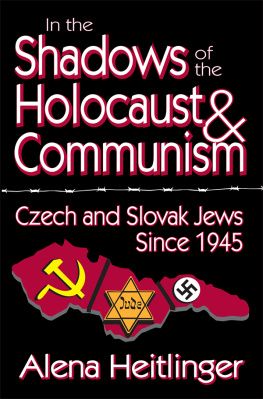
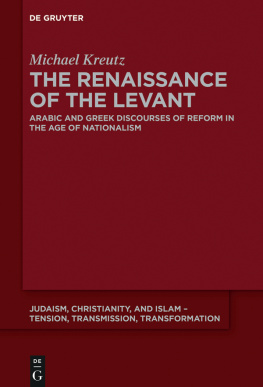
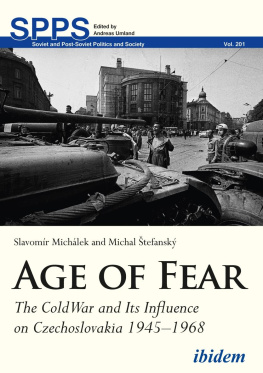
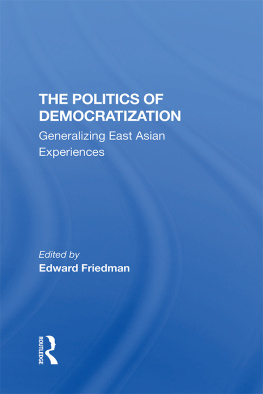
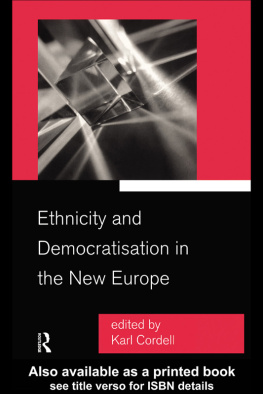
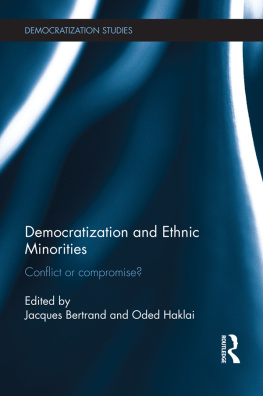
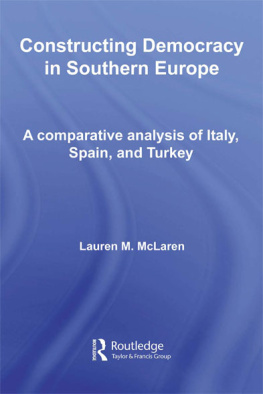
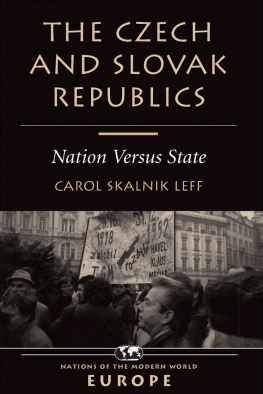
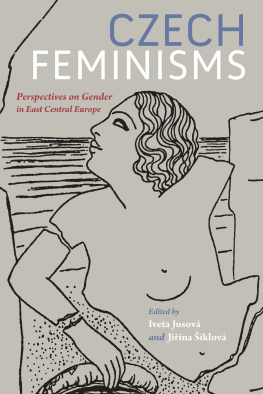
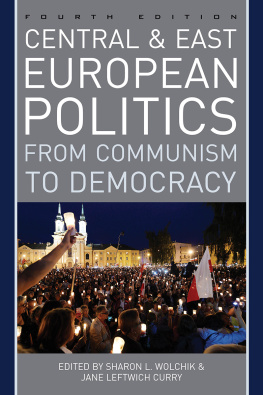


 The paper used in this publication meets the minimum requirements of American National Standard for Information SciencesPermanence of Paper for Printed Library Materials, ANSI Z39.481992.
The paper used in this publication meets the minimum requirements of American National Standard for Information SciencesPermanence of Paper for Printed Library Materials, ANSI Z39.481992. ovali jako svj pirozen domov a sama mylenka na jeho rozdlen byla tvrdm tokem na tuto nai identifikaci. Proto mnoz z ns vloili nemlo sil do pokusu pebudovat tehdej formln federaci na federaci skutenou a demokratickou, v n by se vichni ctili dobe. Toto sil nevedlo k spchu. Historikov s odstupem asu posoud, zda bylo nespn proto, e bylo nekoncepn, nedsledn nebo v samch svch vchodiscch tak i onak vadn, anebo proto, e tv v tv slovenskm tubm spn prost bt nemohlo. A
ovali jako svj pirozen domov a sama mylenka na jeho rozdlen byla tvrdm tokem na tuto nai identifikaci. Proto mnoz z ns vloili nemlo sil do pokusu pebudovat tehdej formln federaci na federaci skutenou a demokratickou, v n by se vichni ctili dobe. Toto sil nevedlo k spchu. Historikov s odstupem asu posoud, zda bylo nespn proto, e bylo nekoncepn, nedsledn nebo v samch svch vchodiscch tak i onak vadn, anebo proto, e tv v tv slovenskm tubm spn prost bt nemohlo. A